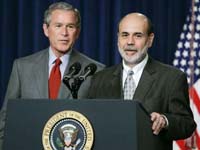Fed chairman remains optimistic about U.S. economy
Federal Reserve Chairman Ben Bernanke told Congress Wednesday that the economy should grow modestly this year despite lingering pain from a housing slump and stuck to the Fed's forecast that inflation will continue to ebb.

Still, Bernanke wasn't prepared to declare victory and close the door on the possibility of further interest rate increases. Even with recent improvements in "core" or underlying inflation, the situation remains "somewhat elevated," he said. Core inflation excludes the more volatile categories of energy and food.
Bernanke, delivering the Fed's first economic report for 2007 to Capitol Hill, offered a mostly upbeat assessment of the economy's outlook. Besides improvements on the inflation front, the Fed chief also cited some signs of stabilization in the ailing housing market.
"Overall, the U.S. economy seems likely to expand at a moderate pace this year and next, with growth strengthening somewhat as the drag from housing diminishes," the Fed chief said in prepared remarks to the Senate Banking Committee.
Currently, interest rates are at a level that is "likely to foster sustainable economic growth and a gradual ebbing of core inflation," he added.
The Fed has held a key interest rate steady at 5.25 percent since August. Before that, the central bank had steadily boosted rates for two years, the longest ever stretch of increases, to fend off inflation. Many economists predict the Fed will leave rates alone for much of this year.
Even with his mostly positive assessment, Bernanke was careful to hedge his bets and pointed out risks that could upset the generally good economic outlook.
A predominant one is that inflation might flare up, which is why the Fed is still keeping open the option of another rate increase.
It will "be some time before we can be confident that underlying inflation is moderating as anticipated," Bernanke said. If inflation doesn't wane as the Fed expects, policymakers are "prepared to take action," Bernanke said.
On the other hand, there is the risk that a deeper than expected residential real-estate bust could yet unfold, which could hurt overall economic growth, the Fed chairman said. If that were to happen, Bernanke added, the Fed in theory might be inclined to lower rates to help bolster the economy.
Bernanke, however, did not specifically mention the possibility of a rate cut.
Bernanke, a former college professor, marked his one-year anniversary at the Fed on Feb. 1. President George W. Bush tapped him to succeed longtime Chairman Alan Greenspan, who rose to iconic status in his 18-plus years at the helm of the Fed.
Senate Banking Committee Chairman Christopher Dodd, who holds White House aspirations, said he hopes to gain insights from Bernanke on the state of the middle class in the country, reports AP.
Democrats, who are in control of Congress for the first time in 12 years, accuse Bush of not doing enough to narrow economic inequality, which has widened over the past few decades. Finding ways to close that gap between low- and high-income workers is a Democratic priority.
In its latest economic projections, the Fed said that it expects the economy this year to grow between 2.5 percent and 3 percent as measured from the fourth quarter of last year to the fourth quarter of this year. That would be slower than the 3.4 percent growth logged for all of 2006.
"Core" inflation, meanwhile, should ease to between 2 percent to 2.25 percent, which would be down from 2.3 percent last year. The unemployment rate may creep up a bit this year and rise as high as 4.75 percent, which would still be low by historical standards.
Subscribe to Pravda.Ru Telegram channel, Facebook, RSS!


